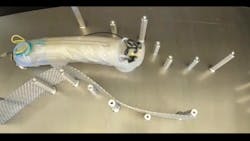GE Aerospace's 'Sensiworm' to aid inspections without engine disassembly
NISKAYUNA, N.Y. - GE Aerospace in Niskayuna, New York, demonstrated its Sensiworm (Soft ElectroNics Skin-Innervated Robotic Worm) solution, which is a sensitive soft robot that could serve as extra sets of eyes and ears for aerospace service operators inside the engine. Currently, these operators use advanced inspection instruments like a video borescope that provide valuable inspection data but are limited in overall turbine coverage because of factors such as gravity that can cause the tip to naturally settle when not braced against a structure within the engine. Deploying self-propelling, compliant robots like Sensiworm would give operators increased access in the future to perform inspections without having to disassemble the engine.
The GE team has demonstrated its ability to move easily on and around the various crevasses and curves of jet engine parts to look for cracks and corrosion. In other lab scale demonstrations, Sensiworm also has been shown to accurately inspect and measure the thickness of thermal barrier coatings on engine parts to determine if parts are maintaining the proper thickness.
Sensiworm could help further expand coverage and inspection capabilities inside an engine compared to technologies presently used. Sensiworm can be deployed through the turbine inlet or exhaust of an engine and provide coverage of a larger swath of the turbine that would otherwise be missed using traditional borescopes, bespoke robotic devices, or snake platforms utilizing conventional port access points. GE Aerospace says its goal is to provide on-wing service personnel with multiple sets of trusted eyes and ears inside the engine that have the ability to inspect and repair critical areas of the engine.
“With mini-robot companions like Sensiworm, service operators would have multiple additional sets of eyes and ears to perform on-wing inspections,” said Deepak Trivedi, Principal Robotics Engineer, GE Aerospace Research. “With their soft, compliant design, they could inspect every inch of jet engine transmitting live video and real-time data about the condition of parts that operators typically check. Sensiworm can even measure the thickness of thermal barrier coatings on parts that are applied to protect the parts from heat.”
“Currently, our demonstrations have primarily been focused on the inspection of engines,” Trivedi added. “But we’re developing new capabilities that would allow these robots to execute repair once they find a defect as well.”
GE Aerospace’s Sensiworm robot has been developed with funding and support through SEMI Flex Tech, an industry-led public/private partnership focused on advancing innovative hybrid electronics developments like Sensiworm. The program is funded by the US Army Research Lab. The GE team also is partnered with Binghamton University, which is home to a world-class Center for Advanced Microelectronics Manufacturing (CAMM), and UES, Inc, an Ohio-based R&D organization that works often with commercial and military partners on advanced technologies in multiple areas that include aerospace and electronics research.
